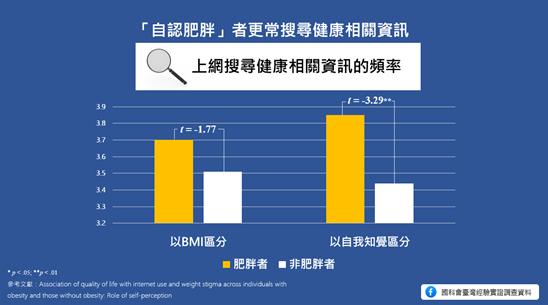Exploring the relationships among obesity, weight stigma, internet use, and quality of life
Compared with those who are overweight but unaware of it, individuals who perceive themselves as overweight tend to be more sensitive to health issues, pay closer attention to their well-being, and have stronger motivation to adopt health-related behaviors. However, weight stigma can act as a barrier in this process.
Lin Zong-Ying et al. (2024), using data from the Taiwan Social Change Survey (TSCS) 2021, Wave 8, Round 2: Health and Medical Care Module, explored the relationships among obesity, weight stigma, internet use, and quality of life. The study found:
🔷 Higher obesity levels were associated with lower quality of life.
🔷 More frequent social media use was associated with better psychological quality of life.
🔷 People who perceive themselves as overweight searched for health-related information online more frequently than those who do not perceive themselves as overweight. However, when obesity was defined using BMI ≥ 27, there was no significant difference in health information searching between groups.
🔷 Among those who perceive themselves as overweight, higher levels of weight stigma were associated with poorer psychological quality of life. This relationship was not significant when obesity was defined by BMI. In other words, people who think they are overweight may be more vulnerable to the negative effects of weight stigma.
Weight stigma refers to prejudice or discrimination against individuals based on their body weight. For example, people with obesity may avoid exercise due to fear of judgment, leading to a vicious cycle of obesity and unhealthy habits.
📌 Study Recommendations:
1. Improve accurate self-perception of body weight. Being obese without realizing it may cause individuals to miss the opportunity for early weight management.
2. Use social media wisely. It may help improve psychological quality of life for people with obesity, but guidance is needed on avoiding harmful comparisons or body-shaming.
3. Address weight stigma. Family and friends should be mindful that biases and discriminatory attitudes toward obesity can lower the motivation of individuals who need weight management to adopt healthier behaviors.


